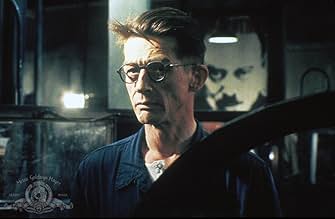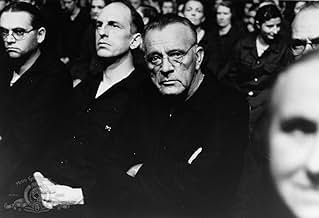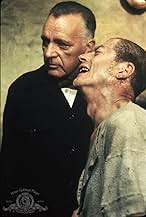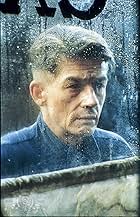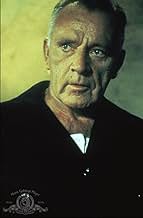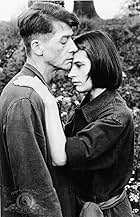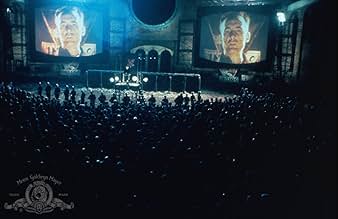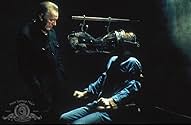Dans une société totalitaire du futur, un homme dont le travail consiste à réécrire l'histoire tente de se rebeller en tombant amoureux.Dans une société totalitaire du futur, un homme dont le travail consiste à réécrire l'histoire tente de se rebeller en tombant amoureux.Dans une société totalitaire du futur, un homme dont le travail consiste à réécrire l'histoire tente de se rebeller en tombant amoureux.
- Réalisation
- Scénario
- Casting principal
- Nomination aux 1 BAFTA Award
- 6 victoires et 3 nominations au total
Avis à la une
While not necessarily a "horror" movie, there is no doubt that "1984" is among the most genuinely SCARY films that I have ever seen. Both the book and film have succeeded in making me shake like drug addicted pepper and salt shakers. The dystopia depicted here accurately displays the horror of an overly controlling and oppressive government system forcing its propaganda upon those below, and outwardly embracing anti-free speech and pro-war beliefs. I must restate how sadly relevant this work remains.
Winston Smith (John Hurt) is a drone worker in the Bureau of Information, and his job is to edit the news in accordance with the needs of the governing Party (which is in continual, seemingly endless war with Eurasia and other opposing states). He must also refer to the dictionary of Newsspeak, which is the government's language for the distribution of information.
He lives in a world where there is no escape from the authority of the government who regiment the every thought and deed of their subjects. The Party is steadily working on a way to outlaw the concept of the family and the idea of conception. This is done to eradicate Thoughtcrime and guarantee the worker's total devotion to the Party and its leader, Big Brother.
Winston abides by this (recording his increasingly ambiguous thoughts about society in a hidden, handwritten diary) until he encounters Julia (Suzanna Hamilton), a strange young women with rebellious ideas, to whom he develops a powerful attraction. But their passionate, forbidden relationship cannot escape the all-seeing eyes of Big Brother.....
Screenwriter Jonathan Gems has a done a terrific job with the script. He successfully translates Orwell's ideas to the screen with great clarity. Micheal Radford directs with subtlety around the greasy sets and crumbling locations (the picture was filmed in and around the very area in which Orwell set his novel).
The performances from the chief principals are very strong. John Hurt is excellent as Winston, bringing a subtle and considerate approach to the character. Particularly disturbing is his final scenes, as he becomes gaunt and disfigured through government torture. Suzanna Hamilton is gentle and quirky as Julia and "Rab C Nesbitt" actor Gregor Fisher appears as Winston's ill-fated friend, Parsons.
Veteran actor Richard Burton lends a cold charisma to government enforcer O'Brien and he too excels in the film's final moments, as he coolly and sadistically tortures Winston, subjecting him to severe physical pain to subdue him, casually pulling a tooth out of his rotting mouth, then exposing him to the horrors of Room 101, all the while exhorting obedience to the Party and love to Big Brother.
The strong relevance of the concepts of "Nineteen Eighty Four" should not be underestimated. Whilst the term "Big Brother" is now synonymous with the ridiculous "reality" TV shows of the same name, others like the Two Minutes Hate (in which the workers are coerced, through a two-minute broadcast, into hating the enemies of the state); the idea of a government waging a perpetual war to advocate "peace" (especially relevant in the aftermath of September 11) as well as the editing of news and the abuse of language in order to suit the needs of government and disguise its true agendas are ideas that are chillingly present in today's society.
All of this is powerful and thought-provoking stuff, and helps to make "Nineteen Eighty Four" an accurate and powerful rendering of a still very timely piece of work.
There are a few successes.
Visually, it manages to capture a run-down nation that has barely progressed for decades, with well chosen locations, and cinematography that succeeds in being washed-out without resorting to darkness (modern filmmakers take note).
Later scenes between Hurt and Burton are taut and powerful. Even though you get the feeling that Burton had done very little to learn his lines, his presence and delivery more than compensate - he is well cast as O'Brien.
But Hurt is not a great Winston Smith. Smith is a dreamer, but Hurt doesn't capture that. His relationship with Suzanna Hamilton's Julia doesn't convince as a result.
The pacing of the first two acts is slow. And I do wonder whether someone who hasn't already read the book would find it had to engage with the film at all. It's just a bit flat.
"1984" is probably one of the most, if not THE most, masterful transitions from book to movie I have ever seen. Easily, its most impressive aspect was its phenomenal accuracy, attention to detail, etc. In other words, this film was FAITHFUL, in every sense of the word, to its source material. One can't give such a statement about films these days.
Amazing casting, terrific musical score, and mind-blowing sets, cinematography, and direction, "1984" is surely a unique treasure, and one that still retains the same timeless messages even decades since its release.
Le saviez-vous
- AnecdotesIn poor health during most of the filming, Richard Burton had great difficulty remembering his lines and sometimes had to film a scene dozens of times before he could get it right. The scene in O'Brien's apartment where he is talking to Winston about Goldstein's book took a record of forty-one takes for Burton to say his speech without fumbling his lines.
- GaffesWinston reads a newspaper article titled "INSOC IN RELATION TO CHESS BROTHER WINS." The party name should be spelled "INGSOC."
- Citations
Winston Smith: [reads from Goldstein's book] "In accordance to the principles of Doublethink, it does not matter if the war is not real, or when it is, that victory is not possible. The war is not meant to be won. It is meant to be continuous. The essential act of modern warfare is the destruction of the produce of human labor. A hierarchical society is only possible on the basis of poverty and ignorance. In principle, the war effort is always planned to keep society on the brink of starvation. The war is waged by the ruling group against its own subjects. And its object is not victory over Eurasia or Eastasia, but to keep the very structure of society intact." Julia? Are you awake? There is truth, and there is untruth. To be in a minority of one doesn't make you mad.
- Crédits fousThe movie begins with the title, "Who controls the past controls the future. Who controls the present controls the past."
- Versions alternativesFrom director of photography Roger Deakins: "Be careful which '1984' you watch as some do not have the 'Bleach Bypass' effect built in. As the effect was done on all the prints, the IP and subsequent INs do not reflect the intended look of the film."
- ConnexionsFeatured in Eurythmics: Sexcrime (Nineteen Eighty-Four) (1984)
- Bandes originalesOceania,'Tis For Thee
Music by Dominic Muldowney
Lyrics by Jonathan Gems
Sung by the London Voices, directed by Terry Edwards
Soprano soloist: Sally Mates
Contralto soloist: Linda Hirst
Conducted by Dominic Muldowney
Meilleurs choix
Détails
- Date de sortie
- Pays d’origine
- Langue
- Aussi connu sous le nom de
- Neunzehnhundertvierundachtzig
- Lieux de tournage
- Sociétés de production
- Voir plus de crédits d'entreprise sur IMDbPro
Box-office
- Budget
- 3 000 000 £GB (estimé)
- Montant brut aux États-Unis et au Canada
- 8 430 492 $US
- Week-end de sortie aux États-Unis et au Canada
- 29 897 $US
- 16 déc. 1984
- Montant brut mondial
- 8 431 544 $US


